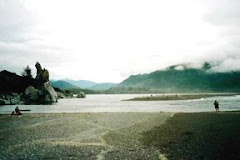The main culprits in our pervasive sediment problem are related to logging - including the many thousand miles of logging road that receive little to no annual maintenance. Roads which are not maintained are not only chronic sediment sources they also fail sooner or later often resulting in catastrophic sediment torrents that scour streams and fill deep pools with sediment.
By removing the rooted vegetation which holds steep, unstable slopes in place, clearcuts also lead to chronic and catastrophic sediment delivery to streams. And studies by Forest Service researchers have consistently found that the combination of roads and clearcuts increases landsliding rates 50 to 100 times above natural background rates.
The Board has extended the time period for comment until December 14.
The Regional Water Board will now consider Resolution No. R1-2007-0095 at its January 17, 2008, meeting in Santa Rosa. The Resolution directs staff to execute the sediment control tasks described in the Work Plan. Also during the January Board Meeting, staff will present a summary of written comments received and the public will have another opportunity to give oral comments.
The Work Plan to Control Excess Sediment in Sediment-Impaired Watersheds (the Work Plan) is available for public review at http://www.waterboards.ca.gov
Those who comment should insist that the Waterboard:
1. Require that timber companies, the Forest Service and other large landowners conduct annual and post-major-storm road inspections and fix the road drainage and road failure problems these inspections uncover.
2. Prohibit clearcutting on those landforms - including steep slopes, inner gorges and earthflows - which experience and research indicate are likely to produce landslides during major storms if they are clearcut. Lands with the potential to generate large landslides which deliver sediment to streams should be protected in the same ways that we protect streamside riparian areas.
If you have questions or comments on the Work Plan, contact Rebecca Fitzgerald of the Waterboard's staff: 707-576-2650 or rfitzgerald@waterboards.ca.gov.


1 comment:
Sounds like a promising start. Hopefully, things go well with little resistance so people can get things finished!
Post a Comment